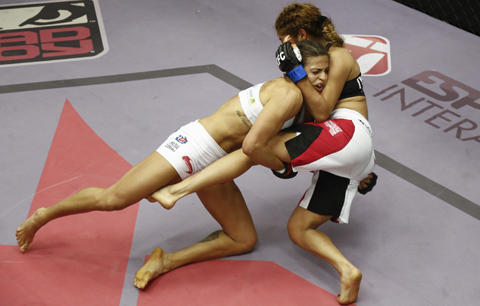 SAO PAULO: The black eyes, scrapes and sweat get a little in the way of Poliana Botelho's smile but her euphoria after winning a Mixed Martial Arts title fight in Sao Paulo is unmistakable. Although the Brazilian gets battered in the September 19 clash in Brazil's biggest city, she wins the MMA's Xtreme Fighting Championships franchise belt and her opponent is left semi-conscious and receiving medical attention.
SAO PAULO: The black eyes, scrapes and sweat get a little in the way of Poliana Botelho's smile but her euphoria after winning a Mixed Martial Arts title fight in Sao Paulo is unmistakable. Although the Brazilian gets battered in the September 19 clash in Brazil's biggest city, she wins the MMA's Xtreme Fighting Championships franchise belt and her opponent is left semi-conscious and receiving medical attention.
Botelho's compatriot Bethe Correia had less luck just a few weeks earlier when she was knocked out within 34 seconds by the world's top female MMA fighter, the United States' Ronda Rousey, holder of the most prestigious UFC belt. But whatever the ups and down, Brazilian women are rising in the world of MMA, a supremely gladiatorial discipline that has become a global pay-per-view success, often staged in cage-like rings where fighters combine facets of different martial arts, ranging from karate to wrestling to boxing.
With their long history of jiu-jitsu fighting and an MMA-precursor called "vale tudo," or "anything goes," Brazilians seem to have taken naturally to the sport. Subscriptions to Combate television, which specializes in showing MMA, have gone up 500 percent since 2010, the channel said. Like other fighting sports, MMA has long been male-dominated, but the female version is especially strong in Brazil. A survey by research group Ibope found that 45 percent of the most ardent fans here are women. And on Combate, the main website for MMA enthusiasts here, 20 of the 25 most popular articles in August were about female fights.
Beauty with attitude
Three years ago Botelho, then 23, took up Thai boxing as a way to lose weight. But her competitive attitude caught the trainer's eye and she learned quickly. Just a few months later she was taking part in her first MMA bout. Despite this quick progress, she didn't fit what most people would consider the standard image of a fulltime fighter. "When I turned professional, a friend said to me, 'But Poliana, you wouldn't hurt a fly!' I explained that this is just a sport. People imagine that it's all about blood and blows, but that's not the case."
From the start, Botelho got family support, even if one aunt said that with her good looks she shouldn't be going in the ring. Taking hits and kicks isn't the only physical challenge of being a professional fighter. Severe weight controls mean that even drinking a glass of water can be an issue before a fight, when she must measure in below her weight category's limit of 56.7 kilograms. Botelho says MMA has a special intensity between women. "Men spend a lot of time studying their opponent, but women attack from the very start because there's more rivalry between us. We have a need to be the best, the most beautiful, and that's something we all share," Botelho said.
Extreme sacrifice
The combate.com website had an audience of about five million Brazilians during the weekend of the Correia-Rousey fight in August in Rio de Janeiro. Globo TV doubled its usual audience with the late-night bout. Rousey is not just the best female MMA fighter in the world and last year the eighth highest paid sportswoman, but a Hollywood star whose good looks have helped her cross marketing boundaries, earning $6.5 million between June 2014 and June 2015, according to Forbes magazine.
Correia has made huge sacrifices in her quest to displace Rousey as queen of the Ultimate Fighting Championship franchise, which gets some 800 million viewers from 129 countries for big fights. She gave up her marriage and stable job as an accountant in exchange for the adrenalin of the ring four years ago. "When my family found out I was going to turn professional they panicked. They thought I'd gone mad," said Correia, who at 32 has moved base to California, where she can get better training.
The image of the fighter is hard to square with the soft voice during a telephone interview with AFP, or Correia's appearance in make-up and flashy clothing along with Rousey before their bout. But Correia says MMA is always about more than pure violence. "We train a lot to learn to defend ourselves, to take blows without getting hurt. It is a very technical and professional sport," she said. "It is not street brawling. We confront someone of our weight and there are rules, referees and doctors." Not that MMA's women will shirk pain and violence in their quest for glory. "What I want now is to be the best in the world," Botelho said. "I want to be capable of overcoming anyone."- AFP










